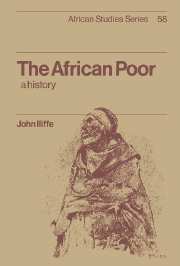Book contents
- Frontmatter
- Contents
- Preface
- 1 The comparative history of the poor
- 2 Christian Ethiopia
- 3 The Islamic tradition
- 4 Poverty and power
- 5 Poverty and pastoralism
- 6 Yoruba and Igbo
- 7 Early European initiatives
- 8 Poverty in South Africa, 1886–1948
- 9 Rural poverty in colonial Africa
- 10 Urban poverty in tropical Africa
- 11 The care of the poor in colonial Africa
- 12 Leprosy
- 13 The growth of poverty in independent Africa
- 14 The transformation of poverty in southern Africa
- Notes
- Bibliography
- Index
1 - The comparative history of the poor
Published online by Cambridge University Press: 31 October 2009
- Frontmatter
- Contents
- Preface
- 1 The comparative history of the poor
- 2 Christian Ethiopia
- 3 The Islamic tradition
- 4 Poverty and power
- 5 Poverty and pastoralism
- 6 Yoruba and Igbo
- 7 Early European initiatives
- 8 Poverty in South Africa, 1886–1948
- 9 Rural poverty in colonial Africa
- 10 Urban poverty in tropical Africa
- 11 The care of the poor in colonial Africa
- 12 Leprosy
- 13 The growth of poverty in independent Africa
- 14 The transformation of poverty in southern Africa
- Notes
- Bibliography
- Index
Summary
There are three reasons for writing a book on this subject. One is that poverty is growing today in sub-Saharan Africa, terribly in the form of mass famine and insidiously in the declining living standards of remote villages and urban shanty towns. Contemporary poverty has become an important subject of research, notably in Nigeria, in the numerous country studies sponsored by the International Labour Office and the World Bank, and in the massive Carnegie Inquiry into poverty and development in southern Africa. The hope that research and practical thought about poverty may benefit from a historical perspective is one reason for this first attempt to provide one.
A second reason for writing the book is a belief that Africa's splendour lies in its suffering. The heroism of African history is to be found not in the deeds of kings but in the struggles of ordinary people against the forces of nature and the cruelty of men. Likewise, the most noble European activities in Africa have been by those – often now almost forgotten – who have cared for the sick and starving and homeless.
The third reason is academic. The old imperial history was marred by an elitism which, because the elite was often a tiny white minority, could degenerate further into racialism. The national histories that have replaced it, by contrast, are marred by their parochialism.
- Type
- Chapter
- Information
- The African PoorA History, pp. 1 - 8Publisher: Cambridge University PressPrint publication year: 1987

